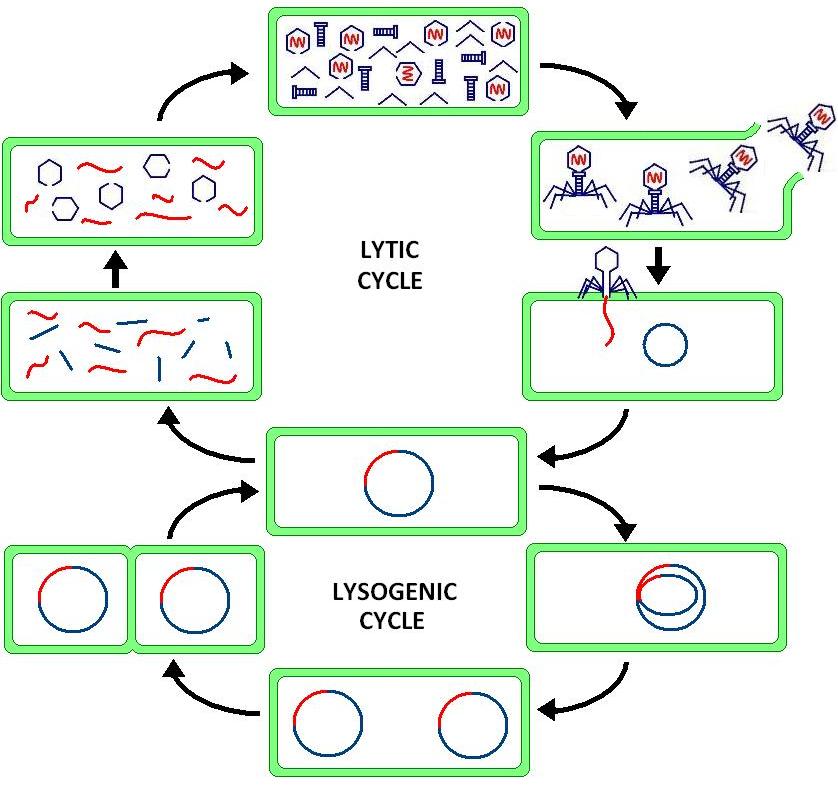Lysogenic Cycle – Botany Notes – For W.B.C.S. Examination.
Viruses are species specific, but almost every species on Earth can be affected by some form of virus.Continue Reading Lysogenic Cycle – Botany Notes – For W.B.C.S. Examination.
- The lytic cycle involves the reproduction of viruses using a host cell to manufacture more viruses; the viruses then burst out of the cell.
- The lysogenic cycle involves the incorporation of the viral genome into the host cell genome, infecting it from within.
- latency: The ability of a pathogenic virus to lie dormant within a cell.
- bacteriophage: A virus that specifically infects bacteria.
- lytic cycle: The normal process of viral reproduction involving penetration of the cell membrane, nucleic acid synthesis, and lysis of the host cell.
- lysogenic cycle: A form of viral reproduction involving the fusion of the nucleic acid of a bacteriophage with that of a host, followed by proliferation of the resulting prophage.
Different Hosts and Their Viruses
Viruses are often very specific as to which hosts and which cells within the host they will infect. This feature of a virus makes it specific to one or a few species of life on earth. So many different types of viruses exist that nearly every living organism has its own set of viruses that try to infect its cells. Even the smallest and simplest of cells, prokaryotic bacteria, may be attacked by specific types of viruses.
Bacteriophages are viruses that infect bacteria. Bacteriophages may have a lytic cycle or a lysogenic cycle, and a few viruses are capable of carrying out both. When infection of a cell by a bacteriophage results in the production of new virions, the infection is said to be productive.
Lytic Cycle
With lytic phages, bacterial cells are broken open (lysed) and destroyed after immediate replication of the virion. As soon as the cell is destroyed, the phage progeny can find new hosts to infect. An example of a lytic bacteriophage is T4, which infects E. coli found in the human intestinal tract. Lytic phages are more suitable for phage therapy.
Some lytic phages undergo a phenomenon known as lysis inhibition, where completed phage progeny will not immediately lyse out of the cell if extracellular phage concentrations are high.
Lysogenic Cycle
In contrast, the lysogenic cycle does not result in immediate lysing of the host cell. Those phages able to undergo lysogeny are known as temperate phages. Their viral genome will integrate with host DNA and replicate along with it fairly harmlessly, or may even become established as a plasmid. The virus remains dormant until host conditions deteriorate, perhaps due to depletion of nutrients; then, the endogenous phages (known as prophages) become active. At this point they initiate the reproductive cycle, resulting in lysis of the host cell. As the lysogenic cycle allows the host cell to continue to survive and reproduce, the virus is reproduced in all of the cell’s offspring. An example of a bacteriophage known to follow the lysogenic cycle and the lytic cycle is the phage lambda of E. coli.
Latency Period
Viruses that infect plant or animal cells may also undergo infections where they are not producing virions for long periods. An example is the animal herpes viruses, including herpes simplex viruses, which cause oral and genital herpes in humans. In a process called latency, these viruses can exist in nervous tissue for long periods of time without producing new virions, only to leave latency periodically and cause lesions in the skin where the virus replicates. Even though there are similarities between lysogeny and latency, the term lysogenic cycle is usually reserved to describe bacteriophages.
Please subscribe here to get all future updates on this post/page/category/website


 Toll Free 1800 572 9282
Toll Free 1800 572 9282  mailus@wbcsmadeeasy.in
mailus@wbcsmadeeasy.in



















































































































